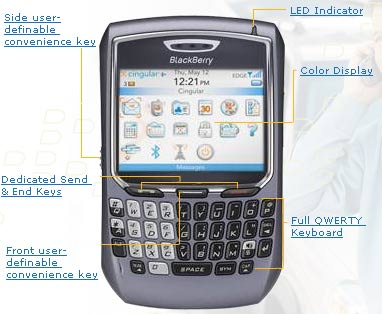 The pending Japan arrival of Research in Motion (RIM)’s hyperpopular BlackBerry email device, widely known as the ‘CrackBerry’ for its simple, efficient and addictive delivery of corporate email, will inject a new dimension into this country’s complex device and service matrix.
The pending Japan arrival of Research in Motion (RIM)’s hyperpopular BlackBerry email device, widely known as the ‘CrackBerry’ for its simple, efficient and addictive delivery of corporate email, will inject a new dimension into this country’s complex device and service matrix.
A wise move or a sign of desperation? These two viewpoints seem to characterize media, pundits’ and bloggers’ responses to last month’s announcement that DoCoMo would bring the BlackBerry email device into Japan, in partnership with RIM, based in Canada. Our own take on it was: Who Cares? WWJ was mindful that “virtually everyone in Japan’s workforce already has an always-on, fully connected email device right in their back pocket — in other words, a phone!”
Furthermore, before and since then, there has been more news, helping make it even more difficult to assess the BlackBerry’s prospects.
According to the pundits, NTT DoCoMo’s decision to import the BlackBerry is either (a) a master stroke aimed at securing the giant carrier’s corporate mobile offerings as 3G competition heats up in 2006/07, or (b) expensive folly that will see enterprise sales teams saddled with a clunky, ‘not-made-here’ device that competes poorly if at all against universal 3G phones that already receive push mail in real time, thank you very much (and some media reports have stated the first Japan BlackBerrys won’t even accept Japanese text input). The truth, however, is probably somewhere between these extremes, and so WWJ went straight to the source.


 The pending Japan arrival of Research in Motion (RIM)’s hyperpopular BlackBerry email device, widely known as the ‘CrackBerry’ for its simple, efficient and addictive delivery of corporate email, will inject a new dimension into this country’s complex device and service matrix.
The pending Japan arrival of Research in Motion (RIM)’s hyperpopular BlackBerry email device, widely known as the ‘CrackBerry’ for its simple, efficient and addictive delivery of corporate email, will inject a new dimension into this country’s complex device and service matrix. Despite all the effort WWJ has put into finding and covering software developers that have successfully transitioned out of Japan’s navel-gazing mobile market to markets elsewhere, I must admit we haven’t found thousands. Or even dozens. But one of them is Shinjuku, Tokyo-based
Despite all the effort WWJ has put into finding and covering software developers that have successfully transitioned out of Japan’s navel-gazing mobile market to markets elsewhere, I must admit we haven’t found thousands. Or even dozens. But one of them is Shinjuku, Tokyo-based